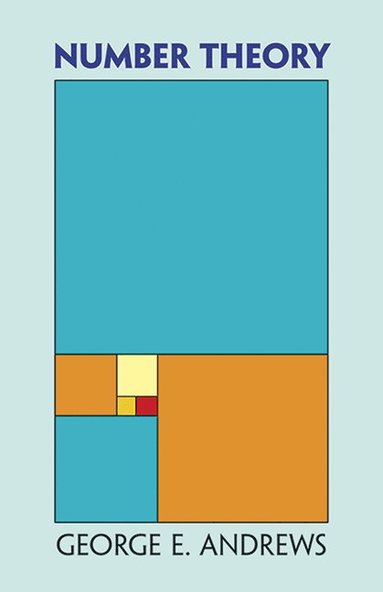
- Format
- Häftad (Paperback / softback)
- Språk
- Engelska
- Serie
- Dover Books on MaTHEMA 1 4tics
- Utgivningsdatum
- 2000-02-01
- Förlag
- Dover Publications Inc.
- Dimensioner
- 215 x 136 x 16 mm
- Vikt
- ISBN
- 9780486682525
- 280 g
Number Theory
- Skickas från oss inom 5-8 vardagar.
- Fri frakt över 249 kr för privatkunder i Sverige.
Passar bra ihop
De som köpt den här boken har ofta också köpt Orbital av Samantha Harvey (häftad).
Köp båda 2 för 339 krKundrecensioner
Fler böcker av författarna
-
Ramanujan's Lost Notebook
George E Andrews, Bruce C Berndt, George E Andrews, Bruce C Berndt
-
Integer Partitions
George E Andrews, Kimmo Eriksson, George E Andrews, Kimmo Eriksson
-
The Theory of Partitions
George E Andrews, George E Andrews, Andrews George E
-
Special Functions
George E Andrews, Richard Askey, Ranjan Roy, George E Andrews, Richard Askey
Övrig information
The Holy Grail of Number Theory George E. Andrews, Evan Pugh Professor of Mathematics at Pennsylvania State University, author of the well-established text Number Theory (first published by Saunders in 1971 and reprinted by Dover in 1994), has led an active career discovering fascinating phenomena in his chosen field ¿ number theory. Perhaps his greatest discovery, however, was not solely one in the intellectual realm but in the physical world as well. In 1975, on a visit to Trinity College in Cambridge to study the papers of the late mathematician George N. Watson, Andrews found what turned out to be one of the actual Holy Grails of number theory, the document that became known as the "Lost Notebook" of the great Indian mathematician Srinivasa Ramanujan. It happened that the previously unknown notebook thus discovered included an immense amount of Ramanujan's original work bearing on one of Andrews' main mathematical preoccupations ¿ mock theta functions. Collaborating with colleague Bruce C. Berndt of the University of Illinois at Urbana-Champaign, Andrews has since published the first two of a planned three-volume sequence based on Ramanujan's Lost Notebook, and will see the project completed with the appearance of the third volume in the next few years. In the Author's Own Words: "It seems to me that there's this grand mathematical world out there, and I am wandering through it and discovering fascinating phenomena that often totally surprise me. I do not think of mathematics as invented but rather discovered." ¿ George E. Andrews
Du kanske gillar
-
Empire of AI
Karen Hao
Inbunden -
Matrescence
Lucy Jones
Häftad


